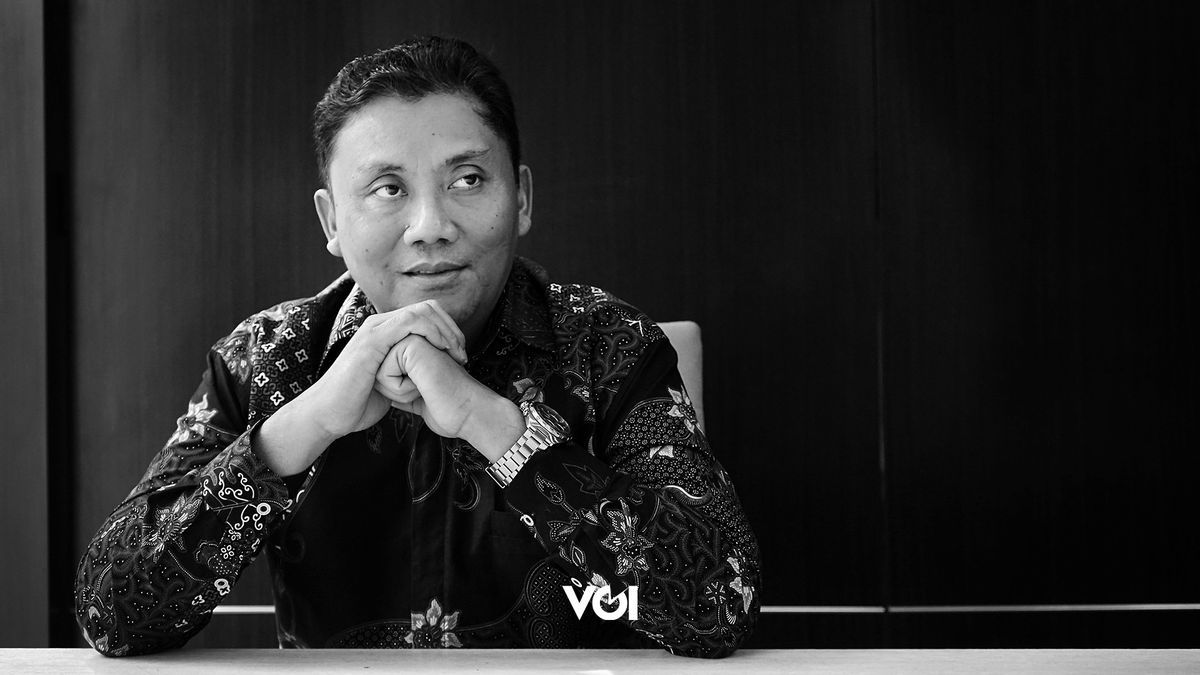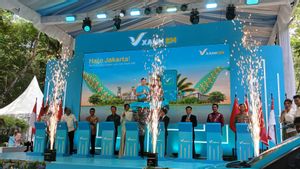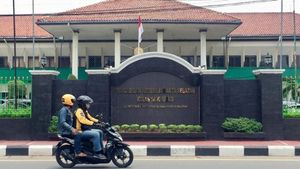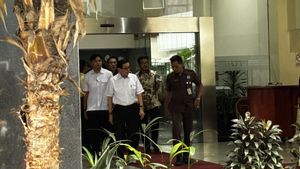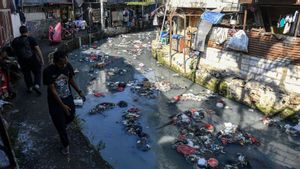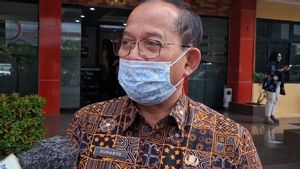Tapera suddenly shocked many parties, from entrepreneurs, workers, observers, academics to council members. In fact, according to BP Tapera Commissioner Heru Pudyo Nugroho, SE, MBA, regulations regarding Tapera will not be implemented in the near future. When all the supporting infrastructure is ready, it will be implemented.
***
Heru admitted that the commotion about Tapera was due to a lack of socialization. “Not many people know about it because the outreach has not been massive. Moreover, PP 25 of 2020 concerning the Implementation of Tapera, which is a derivative of this law, was only published at the end of May 2020, this coincided with the COVID-19 pandemic," he explained.
In fact, it is not only Indonesia that applies the concept of saving to help people in the MBR (Low Income Communities) category in obtaining housing. Indeed, it is not the same between one country and another. “China, for example, has a Housing Provident Fund program, their deduction is 10%, 5% from workers and 5% from employers. In Malaysia there is an Employee Provident Fund, this is overall social security including housing. In Singapore there is a Central Provident Fund, one of its features is housing financing. For Japan there is a well-known program with a flat 35 concept, so the installments are flat over 35 years," he said.
One thing that has been misunderstood, continued Heru, is that only with savings taken at 3% of employee income, BP Tapera will build a house. In fact, what is true is that Tapera participants who have joined for 12 months or more can get a KPR (Home Ownership Credit) from BP Tapera. The amount is according to the price of the house to be built. The advantage is that the interest is lower than market interest rates and installments can be made affordable.
Apart from all that, this Tapera will not be implemented in the near future. Everything is still in the preparation stage. "In principle, this program is not yet running, we are still preparing ourselves. And when it is implemented it will be gradual, taking into account the socio-economic conditions of the community," said Heru Pudyo Nugroho to Edy Suherli, Bambang Eros, and Irfan Medianto from VOI who visited him at the BP Tapera Office, in the Blok M area, Kebayoran Baru, South Jakarta recently. Here is the full excerpt.

Even though employers and workers reject Tapera, according to BP Tapera Commissioner Heru Pudyo Nugroho, his party respects this aspiration. (Photo; Bambang Eros, DI; Raga Granada VOI)
Even though the excitement about Tapera has subsided somewhat, it is still a topic of conversation. Why do you think this might happen?
Tapera is a new thing for society, even though there is already Law No. 4 of 2016 concerning Tapera. However, not many people know about this because the socialization has not been massive. Moreover, PP 25 of 2020 concerning the Implementation of Tapera, which is a derivative of the Law, was published at the end of May 2020, this coincided with the COVID-19 pandemic. So the government and society's attention has not yet been paid to this PP, it is still focused on dealing with and recovering from COVID-19.
Tapera has attracted public controversy, were workers and employers or their representatives not previously consulted?
The preparation of Law No. 4 of 2016 involved all parties; stakeholders, employers' associations and workers' associations coordinated by the Ministry of Manpower. When this law is passed, the outreach may be less massive. When forming derivative regulations, relevant stakeholders are also involved. Including when PP No. 21 of 2024 was issued, which was a refinement of PP No. 25 of 2020. The government included the Ministry of Finance, Ministry of PUPR, Ministry of Manpower and also BP Tapera. In fact, the Ministry of Manpower has carried out an FGD (Focus Group Discussion) on this matter involving Apindo (Indonesian Employers' Association) and workers' associations.
However, the current reality is that workers and entrepreneurs have one voice, objecting to Tapera, what about this?
That is the aspiration of today's employers and unions, we really appreciate and respect. In the conception of the Law, Tapera is mandatory. All workers, including self-employed workers, who earn a minimum minimum wage are required to become participants. The provisions regulated by PP 20 of 2020 are that every worker is deducted 3 percent of their income. There is no basis for determining the size of this cut. This still requires technical regulations at ministerial level. Of that number, 0.5% from companies and 2.5% from workers.
We understand that in the midst of the current situation, post-pandemic, everyone is still in difficult conditions. Although the context of PP 21 of 2024 has not been explained when Tapera will be implemented, there is a time period of at least seven years before it is implemented. So PP 21, which revised PP No. 25, shocked the public.
The Minister of PUPR has also said that there is a delay and it will be implemented in 2027, before that will there be any improvements?
We have only been on duty since March 13 2024, one of the mandates is for us to help improve the governance of BP Tapera. Building a business concept that can provide justice and benefits for all Tapera participants. So the process is ongoing, including the birth of PP 21 of 2024 within that framework.

BP Tapera Commissioner Heru Pudyo Nugroho emphasized that currently Tapera has not yet been implemented, when everything is ready it will be implemented. (Photo; Bambang Eros, DI; Raga Granada VOI)
The question that many people ask is, how can saving 3% of your monthly income be able to build a house?
The committee chaired by the Minister of PUPR is the highest organ at BP Tapera. We will heed the direction of the Committee. Will it take effect in 2027? Not necessarily, it depends on BP Tapera's readiness. Can we convey the benefits of Tapera to the community? If they can accept it, it is hoped that membership can grow. If they realize that without being obliged, they will join.
Tapera is savings, why does it have to be mandatory, can't it be made voluntary and mandatory for those who don't have a house?
The spirit of Tapera is to help each other between those who already have homes and those who don't, especially those from the MBR (Low Income Communities) group. Therefore, those who already have houses also join. So, they can get loans for house renovations or just as noble savers. This savings is collected and fertilized and then returned to the participant at the end of the membership period. Tapera participants can access home financing with very cheap interest, below market interest. The interest rate is around 5%. Participants can pay the house construction costs in very affordable installments. The principle is like that. So it's not the 3% savings to build a house. But participants can borrow money to build a house at Tapera.
There is an Additional Service Benefit (MLT) facility from the BPJS Employment Old Age Security (JHT) program funding source, the concept is similar, does this not overlap?
Conceptually, Tapera is intended to make it easier for participants to own a house through low-interest financing, so it can reduce the gap between those who already have and those who don't have a house. This is for all citizens, especially for MBR. BPJS Employment is a benefit of additional services, for workers who don't have a house or are renovating a house. So the principles are different, one is for all citizens, the other is additional benefits for BPJS participants. In terms of interest, Tapera is also lower. In terms of utilization, Tapera, through the FLPP (Housing Financing Liquidity Facility) program, uses private sector workers who are also BPJS members. Even though the concepts are different, they complement each other. As before, Askes was only for civil servants and TNI-Polri, then it was expanded to BPJS for all citizens.
Because Tapera lacked socialization, in the end the issue went wild, some said the funds collected were to build IKN Nusantara and other projects, your response?
The initial concept for Tapera came from Law No. 1 of 2011 concerning Housing and Settlement Areas. This law mandates the government to form a public legal entity that specifically manages housing finance with a savings concept. Its actualization was continued in Law No. 4 of 2016 concerning Tapera. This all existed long before the concept of IKN Nusantara was launched. This tapera can only be used to finance housing, as mandated by Law No. 4 of 2016. Or it can be returned to the principal participant and fertilized at the end of the membership period. Not allowed for anyone else.
Is there a guarantee that Tapera funds are only for housing, not anything else?
The law regulates everything from the mobilization of funds, fertilization to distribution. Each member has a personal account. Through Tapera Mobile, participants can monitor their savings and fertilization amounts, as well as fertilization graphs from month to month. When saving, it goes directly into the holding bank account and is registered in the individual's name. BP Tapera's fertilization process also cannot be done directly, it must go through a professional investment manager. Utilization is also the same, BP Tapera does not enter into any engagement with the developer, everything goes through the channeling bank. BP Tapera is only a regulator, not an operator.
For investment managers, even though they are professionals, is there a tolerance for experiencing risk?
The appointment of this investment manager is closely monitored by the OJK and they also directly monitor its performance. BP Tapera periodically confirms and evaluates its performance. And permitted investment instruments include; state bonds, regional bonds, securities in the housing sector and residential areas, and other instruments that are safe and profitable. So the process is very strict.
BP Tapera has a target of how many participants can be helped to build/renovate houses?
Currently BP Tapera manages two funding portfolios; FLPP and funds carried over from Bapertarum (funds collected from ASN/TNI/Polri). Since 2010, FLPP has helped build 1,429,000 housing units. Meanwhile, Tapera collected from our ASN/TNI/Polri has helped build 13,800 housing units. For the next target, we have to adjust to the next government which will soon be inaugurated by the elected President and Vice President.
Have you conducted comparative studies with other countries that are successful in providing housing for the people?
The formation of Law No. 4 of 2016 concerning Tapera has made a comparison with countries that have successfully provided housing for their people. Like in China with the Housing Provident Fund, their deduction is 10%, 5% from workers and 5% from employers. In Malaysia there is an Employee Provident Fund, this is overall social security including housing. In Singapore there is a Central Provident Fund, one of its features is housing financing. For Japan, there is a well-known program with the flat 35 concept, so the installments are flat over 35 years.
Of the many examples in various countries, which one is most suitable for Indonesia?
Tapera refers more to the Housing Provident Fund that China has implemented. Both are mandatory, the only difference is the amount of savings. In China, the amount of funds that can be borrowed is 14 to 15 times the amount of savings. If Tapera is as big as the price of a house. Tapera participants who have saved for 12 months can apply for a KPR.
Due to lack of socialization, what actions is BP Tapera taking for the public?
We have socialized the program through Tapera social media channels, the Tapera website, in various activities we collaborate with the local government. Also outreach with related ministries such as the Ministry of Manpower, regarding the benefits of Tapera. In the future it will be even more massive. In principle, this program is not yet running, we are still preparing ourselves. And when it is implemented it will be gradual, taking into account the socio-economic conditions of the community. Hopefully all parties understand more and can feel the benefits of Tapera.
Heru Pudyo Nugroho's Tips Apart from Work Routine

BP Tapera Commissioner Heru Pudyo Nugroho leads a balanced life, apart from his work routine at the office he also worships, sports and does the arts. (Photo; Bambang Eros, DI; Raga Granada VOI)
BP Tapera Commissioner Heru Pudyo Nugroho, SE, MBA, has to balance his time-consuming activities from Monday to Friday with various activities, ranging from worship, sports and arts. Thus, his life becomes balanced.
There are several ways that Heru does to escape from the routine of work. "My first release as a Muslim was praying five times a day. At that time I took a break from my routine and faced the Almighty. That was the most important release for me," said the man born in Pacitan, East Java, November 12 1972.
After that, what he did was exercise. "Every morning I jog or walk and also stretch, to keep my body fit," he said. "On weekends I usually cycle," continued Heru, who has been traveling all over the city of Jakarta after living in Jakarta for three months.
Apart from exploring the city of Jakarta, his other favorite route is the countryside. "The choice is to go to the Bintaro area and its surroundings. If I go to the village I use an MTB bicycle, while on the Jakarta city route I usually use a folding bicycle," said Heru, who also cycles when he returns to Yogyakarta. "The Bantul, Prambanan and Sleman areas are my choices in Jogja," he added.
Another way to release stress is to sing. "Before going to sleep, I have time to sing at home. This is a trick that I do to not be stressed and relax. The problem is that the workload at the office must be balanced with various activities that make us cheerful," said the Jember University undergraduate alumni [Bachelor of Economics] (1997) and continued studied at Masters level at Gadjah Mada University [Masters in Financial Management] (2009).
In Heru's terms, what he does is balance life. And balance is important for life to run well.
Popular and Traditional Music

Heru Pudyo Nugroho likes pop and traditional music such as campursari. (Photo; Bambang Eros, DI; Raga Granada VOI)
Heru Pudyo Nugroho likes all genres of music. But among the many music genres, there are some that are really liked. "Mostly I like pop music. But I can also enjoy dangdut. And as a Javanese, I am certainly no stranger to Javanese music which is usually called campursari," he said.
As a generation that grew up in the 80s and 90s, most of the singers they like are from that era. However, there are also contemporary singers who fascinate him and then become fans. "I like singers such as Phil Collins, Richard Marx and the Sania Twain. Their songs are good and accompanied me as I grew up," he said.
For campursari singers, the big name Didi Kempot is at the forefront of the list of names of singers he likes. "When it comes to campursari music, of course it is the maestro; the late Didi Kempot is a singer who is always in my heart. His songs, whether cheerful or sad, are all good. I will miss the hometown when I sing Didi Kempot's songs," admitted the recipient of Satya Lancana Karya Satya XX Tahun; Satyalancana Karya Satyadari Presiden RI.
Meanwhile, his favorite young campursari singers are Deni Caknan and Gilga Sahid. "The main thing is to enjoy listening while singing campursari songs. These are tips for maintaining balance in life," he said.
LDR with Wife and Kids

Even though he is in a long distance relationship with his wife and children, communicating by telephone twice a day is a tip for him to build chemistry. (Photo; Bambang Eros, DI; Raga Granada VOI)
As an ASN who started his career at the Ministry of Finance, Heru has served in various cities throughout Indonesia before becoming Commissioner of BP Tapera. "At the Ministry of Finance my work desk is from Sabang to Merauke and Miangas to Rote Island," he said.
The first city when he served as ASN was Palangka Raya, Central Kalimantan. "In Palangka Raya I served for 8.5 years. After that I moved from one city to another. I moved 12 times before finally serving in Jakarta," admitted Heru, who had served in West Sumatra, Riau, Bali, DIY, and others.
Because of this situation, he and his wife agreed to choose to have a long distance relationship. "My wife and children live in Yogyakarta, while I move from one city to another according to assignments from the state. It's a pity for the children if they keep moving," said Heru, who now lives in the Kemang area, South Jakarta.
Even though separated from family, there is no reason not to communicate. "Communication is key, in the morning I call and when I get home from work I also call again. So I call them at least twice a day," said Heru, who once served as Head of Regional Office of the Directorate General of Treasury, West Java Province, Directorate General of Treasury..
Heru Pudyo Nugroho has a message for the younger generation not to be satisfied with what has been achieved. “Keep exploring to find the next points. The way to do this is through hard work and determination to continue learning new things. If we get stuck in one point that becomes our comfort zone we will stop there. So keep moving to achieve better. Wherever you are, you must benefit other people, that is the best of humans," he said.
"Tapera refers more to the Housing Provident Fund that China has implemented. Both are mandatory, the difference is only in the amount of the deposit. In China, the amount of funds that can be borrowed is 14 to 15 times the amount of savings. If Tapera is as big as the price of a house. Tapera participants who have saved for 12 months can apply for a KPR,"
The English, Chinese, Japanese, Arabic, and French versions are automatically generated by the AI. So there may still be inaccuracies in translating, please always see Indonesian as our main language. (system supported by DigitalSiber.id)
